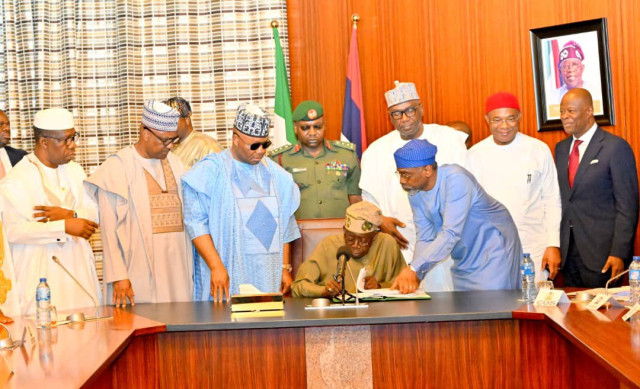ABUJA, Nigeria - President Bola Tinubu has enacted four tax reform bills that focus on crucial aspects of Nigeria's fiscal and revenue framework.
He signed the bills during a ceremony at the Aso Rock Presidential Villa in Abuja at approximately 3:20 PM local time on Thursday.
The four pieces of legislation are the Nigeria Tax Bill, the Nigeria Tax Administration Bill, the Nigeria Revenue Service (Establishment) Bill, and the Joint Revenue Board (Establishment) Bill.
These bills were approved by the National Assembly following extensive consultations with various stakeholders and interest groups.
Once the new tax laws take effect, they are anticipated to greatly enhance tax administration in the country, leading to increased revenue generation, a more favorable business environment, and a rise in both domestic and foreign investments, as stated by Onanuga.
The signing event was attended by key figures including the Senate President, the Speaker of the House of Representatives, the Senate Majority Leader, the House Majority Leader, the chairman of the Senate Financial Committee, and his counterpart from the House.
Also present were the Chairman of the Governors Forum from Kwara State, Abdulrahman Abdulrazaq, the Chairman of the Progressives Governors Forum from Imo State, Hope Uzodinma, the Minister of Finance and Coordination Minister of the Economy, Wale Edun, and the Attorney General of the Federation, Lateef Fagbemi.
One of the bills, the Nigeria Tax Bill (Ease of Doing Business), aims to unify Nigeria's scattered tax laws into a cohesive statute. The Presidency stated on Wednesday night that by streamlining the various taxes and removing redundancies, this bill will improve the ease of doing business, lessen the compliance burdens on taxpayers, and foster a more stable fiscal environment.
The second bill, the Nigeria Tax Administration Bill, intends to create a uniform legal and operational framework for tax administration among federal, state, and local governments.
The third bill, the Nigeria Revenue Service (Establishment) Bill, replaces the existing Federal Inland Revenue Service Act and establishes a more autonomous, performance-oriented national revenue agency— the Nigeria Revenue Service (NRS).
This bill defines the NRS's expanded responsibilities, which includes the collection of non-tax revenues, and outlines mechanisms for transparency, accountability, and efficiency.
The fourth bill is the Joint Revenue Board (Establishment) Bill, which sets up a formal governance framework to ensure collaboration among revenue authorities at all levels of government.
It also introduces critical oversight measures, such as the creation of a Tax Appeal Tribunal and an Office of the Tax Ombudsman.




















